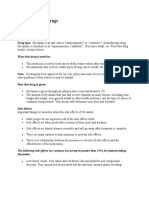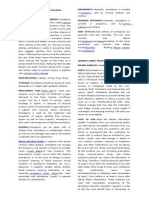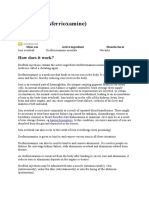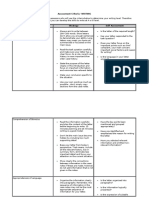Daunorubicin PDF
Daunorubicin PDF
Uploaded by
milahCopyright:
Available Formats
Daunorubicin PDF
Daunorubicin PDF
Uploaded by
milahOriginal Title
Copyright
Available Formats
Share this document
Did you find this document useful?
Is this content inappropriate?
Copyright:
Available Formats
Daunorubicin PDF
Daunorubicin PDF
Uploaded by
milahCopyright:
Available Formats
Patient Care Services
300 Pasteur Drive
Stanford, CA 94305
Daunorubicin (daw noe ROO bi sin)
Patient Education
US Brand Names: Daunorubicin, Cerubudine
Therapeutic Category: chemotherapy
What is this medicine used for?
Used to treat a variety of cancers.
How does it work?
Daunorubicin works by killing rapidly growing cells. This drug will affect all fast growing cells,
cancer cells and normal cells, in your body.
What should my doctor or nurse know before I take this medication?
If you are allergic to any medicines.
If you are taking other over the counter or prescription medicines, including vitamins and
herbal remedies.
If you are, or may be pregnant.
If you are breast feeding.
If you have heart disease.
If you have liver problems.
How is this drug given?
This medicine can be used alone or in combination with other cancer medicine.
This medicine is given into a vein.
What are the general precautions when taking this medicine?
Talk with your doctor or nurse before taking aspirin, aspirin-containing products, over the
counter or prescription medications, including vitamins and herbal remedies.
Drink 8 to10 glasses of non-caffeinated liquid every day (unless told otherwise by your
doctor or nurse).
If you or your partner can get pregnant, use birth control during your treatment. Once completing
treatment, discuss the timing for discontinuing birth control measures with your provider. (See Patient
Teaching Sheet: Fertility)
What are the common side effects of this medicine?
May turn your urine red (not permanent).
Heart damage. There is a recommended maximum cumulative dose of this drug. Heart
damage can occur when this dose is reached.
Nausea and vomiting: take anti-nausea medication as directed. Call for nausea and
vomiting not controlled by prescribed medication and/or inability to eat and drink liquids.
(See Patient Teaching Sheet: Nausea and Vomiting)
May cause alopecia: this medication may make your hair fallout. Hair loss starts about 2 to
3 weeks after you get this drug. Hair on your head is often lost first, but body hair can
thin. Hair re-growth takes about 3 to 5 months after your last dose of this medication.
(See Patient Teaching Sheet: Alopecia)
Myelosuppression (drop in number of blood cells)
Will cause a drop in the number of white blood cells in your body (Neutropenia). These
cells fight infection. A drop in the number of these cells puts you at risk for infection. You
may be at an increased risk for getting an infection during your treatment. Talk to your
doctor or nurse about your risk. Avoid people with infections, colds, or flu when you are at
risk. (See Patient Teaching Sheet: Neutropenia)
Will cause a drop in the number of platelets in your body (Thrombocytopenia). Platelets
help your blood clot. A drop in platelets put you at risk for bleeding. You may bleed easily
during your treatment. Talk to your doctor or nurse about your risk. Avoid injury to your
skin and mucous membranes by using a soft toothbrush, electric razor, etc., when you are
at risk. (See Patient Teaching Sheet: Thrombocytopenia)
Will cause a drop in the number of your red blood cells in your body (Anemia). Red blood
cells carry oxygen throughout your body. This drop in red blood cells may lead to you
feeling tired/fatigued. Talk to your doctor or nurse about your risk. (See Patient Teaching
Sheet: Fatigue)
VESICANT: This drug will cause tissue damage if it leaks out of your vein. If you feel
pain in or around the vein into which the drug is being administered, tell the nurse
IMMEDIATELY.
Danger signals to report immediately to your doctor or nurse:
Signs or symptoms of infection. This include a fever of 100.4 F (38 C) or greater, chills,
severe sore throat, ear or sinus pain, cough, increased sputum or change in color, painful
urination, mouth sores, wound that will not heal, or anal itching or pain.
Severe nausea or vomiting or diarrhea not controlled by medication.
Not able to eat or drink.
Bleeding from your nose, mouth, gums, or in your urine or bowel movements. Bruising
that does not heal.
Feeling extremely tired, weak, dizzy or light headed.
Develop swelling in your hands or feet and/or shortness of breath.
Prepared by the Oncology Nursing Committee 10/04.
Reviewed/revised by Oncology Clinical Nurse Specialist (T. Baltic 4/07); Robert Carlson, MD and Jason Gotlib, MD 6/07.
This document is intended for use by staff of Stanford Hospital and Clinics. No representations or warranties are made for outside use. Not for
reproduction or publication without permission. Direct inquiries to Stanford Hospital and Clinics. 8/07;12/09.
You might also like
- TetracyclineDocument5 pagesTetracyclineMichael Angelo SeñaNo ratings yet
- (K24) Acute & Chronic LaryngitisDocument47 pages(K24) Acute & Chronic LaryngitisSyarifah Fauziah100% (3)
- Dermatological PharmacologyDocument25 pagesDermatological Pharmacologyborneo225100% (1)
- Drug StudyDocument32 pagesDrug StudyPrincess Gutierrez RositaNo ratings yet
- doxorubicin patient handoutDocument8 pagesdoxorubicin patient handoutdirthsNo ratings yet
- Epirubicin: The Following Side Effects Are Common (Occurring in Greater Than 30%) For Patients Taking EpirubicinDocument5 pagesEpirubicin: The Following Side Effects Are Common (Occurring in Greater Than 30%) For Patients Taking EpirubicinSteffi EllaNo ratings yet
- Albiglutide Patient HandoutDocument4 pagesAlbiglutide Patient HandoutHannaNo ratings yet
- Methylprednisolone Oral Uses, Side Effects, Interactions, Pictures, Warnings & Dosing - WebMDDocument1 pageMethylprednisolone Oral Uses, Side Effects, Interactions, Pictures, Warnings & Dosing - WebMDbairesiris0No ratings yet
- 3 Dangerous DrugsDocument7 pages3 Dangerous DrugsCat CouNo ratings yet
- Chemotherapy Drugs: Hycamtin ®Document9 pagesChemotherapy Drugs: Hycamtin ®Ika Kurnia FaizinNo ratings yet
- DocetaxelDocument4 pagesDocetaxelfnurdiansah002No ratings yet
- EplerenoneDocument6 pagesEplerenoneMark DavidsonNo ratings yet
- Aspirin and DipyridamoleDocument6 pagesAspirin and DipyridamoleRoxana Aldea-CiaciruNo ratings yet
- Penicillin G Sodium Injection UsesDocument5 pagesPenicillin G Sodium Injection UsesOliver BagarinaoNo ratings yet
- Drug 2Document6 pagesDrug 2May Ann S. DumalantaNo ratings yet
- PrednisoloneDocument4 pagesPrednisoloneUmemura-san SOkmo100% (1)
- Lajpatrailala 123456Document15 pagesLajpatrailala 123456sastry1946No ratings yet
- BRAND NAME (S) : Unasyn: Generic Name: Ampicillin/Sulbactam - Injection (Am-Pi-Sil-In/Sul-BAK-tam)Document2 pagesBRAND NAME (S) : Unasyn: Generic Name: Ampicillin/Sulbactam - Injection (Am-Pi-Sil-In/Sul-BAK-tam)Oliver BagarinaoNo ratings yet
- 1015775Document12 pages1015775Omar Nassir MoftahNo ratings yet
- Cefadroxil Mylan Capsule Hard, Film-Coated Tablet, Oral Suspension ENG PL - 09001be680190988Document5 pagesCefadroxil Mylan Capsule Hard, Film-Coated Tablet, Oral Suspension ENG PL - 09001be680190988Ajeng VinaNo ratings yet
- Dapagliflozin, Saxagliptin, and Metformin: WarningDocument5 pagesDapagliflozin, Saxagliptin, and Metformin: WarningHannaNo ratings yet
- Lajpatrai 1245Document4 pagesLajpatrai 1245sastry1946No ratings yet
- Cefuroxime (Oral Route) : US Brand NamesDocument9 pagesCefuroxime (Oral Route) : US Brand NamesYaleswari Hayu PertiwiNo ratings yet
- Ibuprofen PDFDocument1 pageIbuprofen PDFDonell EscalanteNo ratings yet
- Augmentin: Generic Name (S) : Amoxicillin/Potassium ClavulanateDocument5 pagesAugmentin: Generic Name (S) : Amoxicillin/Potassium ClavulanateramkumarNo ratings yet
- SOP VerifikasoDocument85 pagesSOP Verifikasofransiska labuNo ratings yet
- PIL 18047 LatestDocument2 pagesPIL 18047 LatestWendy EscalanteNo ratings yet
- Cyclophosphamide (Cytoxan) - Uses & Side EffectsDocument12 pagesCyclophosphamide (Cytoxan) - Uses & Side Effectswanderfun463No ratings yet
- Drug Details PDFDocument4 pagesDrug Details PDFElNo ratings yet
- Page 1 of 5Document5 pagesPage 1 of 5ate29aNo ratings yet
- What Are Immunosuppressants?Document3 pagesWhat Are Immunosuppressants?ghifaryNo ratings yet
- Glycopyrrolate SystemicDocument8 pagesGlycopyrrolate SystemichimanshumanudhaneNo ratings yet
- HTTPDocument4 pagesHTTPTran Thi Thu DungNo ratings yet
- Nivolumab: Other Names: Opdivo®Document6 pagesNivolumab: Other Names: Opdivo®Prabhjot SinghNo ratings yet
- Immu Pembrolizumab (Keytruda)Document5 pagesImmu Pembrolizumab (Keytruda)Pongwirat ChantasoontornNo ratings yet
- Tanaman - Obat .RimpangDocument6 pagesTanaman - Obat .RimpangFany LiyaraniNo ratings yet
- Drug Medicine WardDocument3 pagesDrug Medicine WardDawn NavarroNo ratings yet
- Seizures & Stroke Risk: Brain Injury and General Rehabilitation Information SeriesDocument8 pagesSeizures & Stroke Risk: Brain Injury and General Rehabilitation Information SeriesIli DiyanaNo ratings yet
- StreptokinaseDocument2 pagesStreptokinasePramod RawoolNo ratings yet
- Why Is This Medication Prescribed?: Before Taking ProtriptylineDocument5 pagesWhy Is This Medication Prescribed?: Before Taking ProtriptylineAnthony LopezNo ratings yet
- GupisoneDocument7 pagesGupisoneahibba.03862No ratings yet
- Azathioprine PDFDocument3 pagesAzathioprine PDFAnca AnkaNo ratings yet
- Drug Study GranjaDocument5 pagesDrug Study GranjajolibeecaldonaNo ratings yet
- OndansetronDocument11 pagesOndansetronIlyes FerenczNo ratings yet
- Northyx, Tapazole (Methimazole) Dosing, Indications, Interactions, Adverse Effects, and MoreDocument2 pagesNorthyx, Tapazole (Methimazole) Dosing, Indications, Interactions, Adverse Effects, and MoreDewiAryani11No ratings yet
- Lofnac Suppo Diclofenac Sodium Tablets 100MG PilDocument7 pagesLofnac Suppo Diclofenac Sodium Tablets 100MG PilepakerryNo ratings yet
- Healthy LifeDocument8 pagesHealthy LifeDathshan Murali100% (1)
- EtanerceptDocument4 pagesEtanerceptMaria Alejandra Siachoque JaraNo ratings yet
- RH021 Part 3 V 2Document7 pagesRH021 Part 3 V 2Huey VillanuevaNo ratings yet
- vinblastine patient handoutDocument11 pagesvinblastine patient handoutdirthsNo ratings yet
- PrednisoloneDocument8 pagesPrednisoloneAjaybpaNo ratings yet
- Cefadroxil (Oral Route) - Drugs and Supplements - Mayo ClinicDocument8 pagesCefadroxil (Oral Route) - Drugs and Supplements - Mayo ClinicCempaka Kusuma DewiNo ratings yet
- Propylthiouracil Is Used ForDocument6 pagesPropylthiouracil Is Used Forghazy galibieNo ratings yet
- melphalan patient handoutDocument5 pagesmelphalan patient handoutdirthsNo ratings yet
- Duphaston 10mg Film-Coated Tablets: Package Leaflet: Information For The UserDocument6 pagesDuphaston 10mg Film-Coated Tablets: Package Leaflet: Information For The UsernestoncalvanNo ratings yet
- Desferal (Desferrioxamine) : How Does It Work?Document5 pagesDesferal (Desferrioxamine) : How Does It Work?Aris GunawanNo ratings yet
- Drug Information: RabeprazoleDocument43 pagesDrug Information: Rabeprazolefransiska labuNo ratings yet
- Mycophenolate Mofetil (Cellcept)Document3 pagesMycophenolate Mofetil (Cellcept)M V DarppanNo ratings yet
- Warning of use analgesic in dentistry دادعا يرمعلا رمع يرهزلا قراط هلمعش سنا:روكدلا فرشا تحتDocument8 pagesWarning of use analgesic in dentistry دادعا يرمعلا رمع يرهزلا قراط هلمعش سنا:روكدلا فرشا تحتالعمري العمريNo ratings yet
- brentuximab vedotin patient handoutDocument14 pagesbrentuximab vedotin patient handoutdirthsNo ratings yet
- Complete Guide to Prescription & Nonprescription Drugs 2018-2019From EverandComplete Guide to Prescription & Nonprescription Drugs 2018-2019No ratings yet
- Pegylated Liposomal DoxorubicinDocument40 pagesPegylated Liposomal DoxorubicinAldrin Nathaniel LlanetaNo ratings yet
- Medical History Outline-2020Document9 pagesMedical History Outline-2020sumiti_kumarNo ratings yet
- Renal UltrasoundDocument179 pagesRenal UltrasoundJuhar AhamedNo ratings yet
- MCQsDocument4 pagesMCQsSachin Singh100% (4)
- 1.2 PharmacotherapyDocument25 pages1.2 PharmacotherapyAmina Akther MimNo ratings yet
- SB Unit4 UpperintermedaiteDocument10 pagesSB Unit4 Upperintermedaitelopeza35No ratings yet
- Oet Writing TipsDocument27 pagesOet Writing Tipsbjlk96% (49)
- Lesions of Motor System Lesions of Motor System: Professor Hayder K.HassounDocument17 pagesLesions of Motor System Lesions of Motor System: Professor Hayder K.HassounAhmeed SafaaNo ratings yet
- Notes of VitaminsDocument8 pagesNotes of VitaminsEllyNo ratings yet
- Job Aids TPTDocument10 pagesJob Aids TPTTarikul IslamNo ratings yet
- What Is Hyperaldosteronism?Document7 pagesWhat Is Hyperaldosteronism?sajad abasNo ratings yet
- Six Pack GuideDocument49 pagesSix Pack GuideGeet_D100% (1)
- MCQ Propaedeutics 2023-2024Document47 pagesMCQ Propaedeutics 2023-2024Mani MozhiNo ratings yet
- Hand Hygiene: Simple and Complex: P.A. JumaaDocument12 pagesHand Hygiene: Simple and Complex: P.A. Jumaafarida nur ainiNo ratings yet
- Endocrine GlandsDocument2 pagesEndocrine GlandsCamille CrisostomoNo ratings yet
- Abnormal PsychologyDocument5 pagesAbnormal PsychologyMohammad Al-HarthiNo ratings yet
- Respiratory Passmedicine 2020Document555 pagesRespiratory Passmedicine 2020Vikrant100% (2)
- Gout Treatment Guidelines AafpDocument3 pagesGout Treatment Guidelines AafpGeoffreyNo ratings yet
- Earning Outcomes: LSPU Self-Paced Learning Module (SLM)Document17 pagesEarning Outcomes: LSPU Self-Paced Learning Module (SLM)Aldrin Hardy PabloNo ratings yet
- Non Kepi Vaccines RevisedDocument28 pagesNon Kepi Vaccines Revisedokwadha simionNo ratings yet
- Investigating Maturity Onset Diabetes of The Young: Mini-ReviewDocument8 pagesInvestigating Maturity Onset Diabetes of The Young: Mini-ReviewHadiza PebramaNo ratings yet
- Dental Implant Complications: Alzheimer's DiseaseDocument1 pageDental Implant Complications: Alzheimer's DiseaseMr-Ton DrgNo ratings yet
- FC - AC - OHRS - V10 - 2 - Glossary - of - Terms - FC - AC - FINAL - 2018 - 04 - 01Document113 pagesFC - AC - OHRS - V10 - 2 - Glossary - of - Terms - FC - AC - FINAL - 2018 - 04 - 01janNo ratings yet
- Stroke Script - ABACDocument6 pagesStroke Script - ABACLee AndrewNo ratings yet
- Anorexia NervosaDocument11 pagesAnorexia NervosaSashMalikNo ratings yet
- Skin LMRP 2019Document21 pagesSkin LMRP 2019skNo ratings yet
- Otitis ExternaDocument27 pagesOtitis ExternaKesha Lemons-Price100% (2)
- Pamplet - English PDFDocument4 pagesPamplet - English PDF9884288233100% (1)

























































































